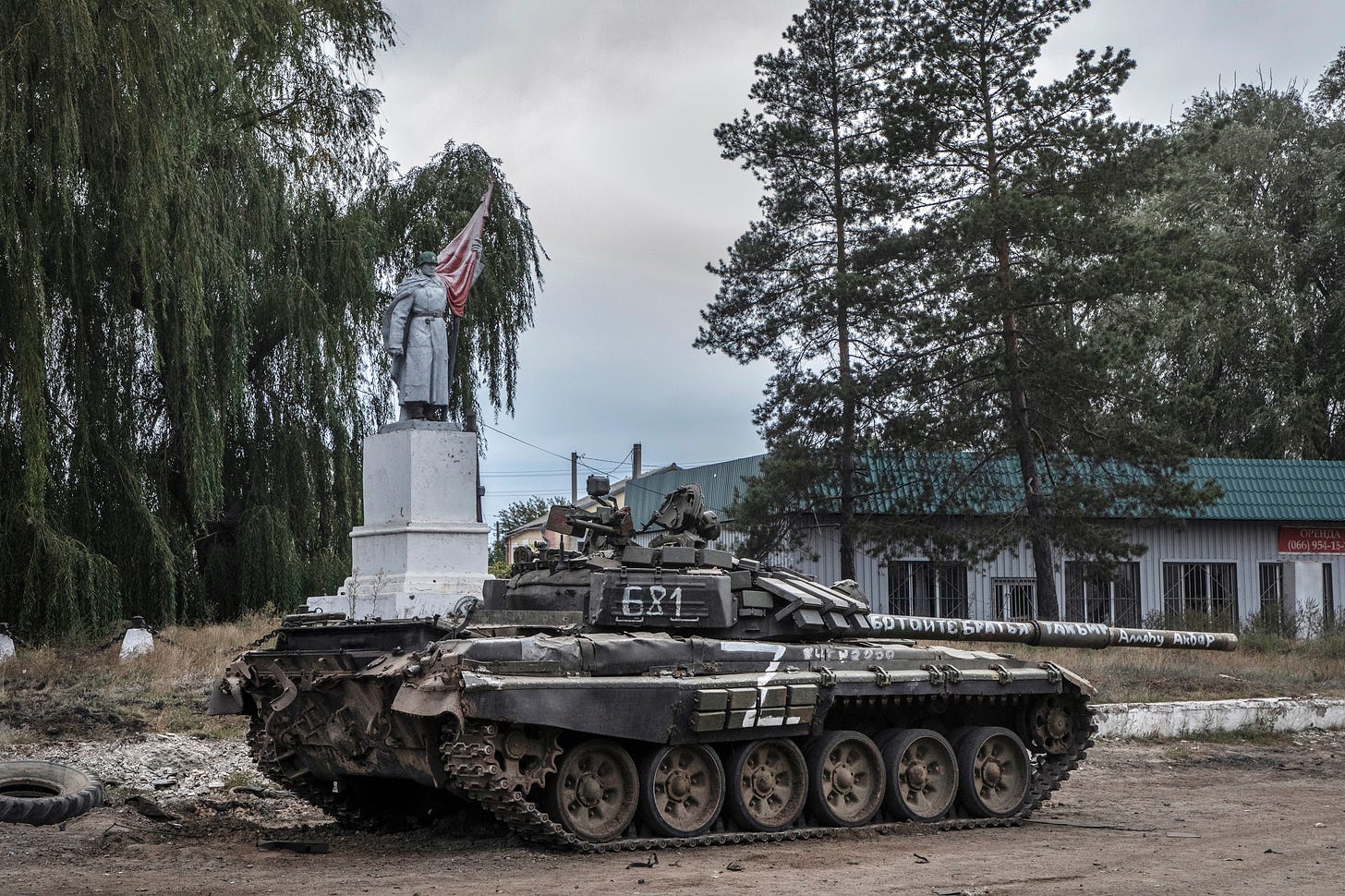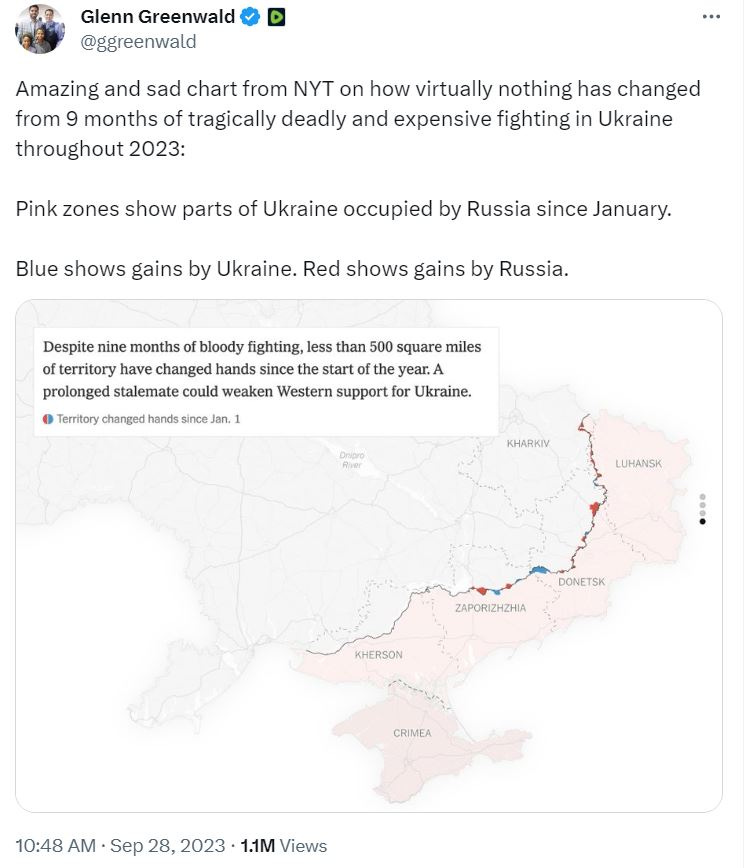What Russian War Hawks Are Saying to Themselves About Ukraine
Rare glimpses of candor suggest tremendous frustration.

THERE’S NO SHORTAGE of rationales offered for opposing American aid to Ukraine in its resistance to Russia’s war of aggression—everything from claims that Ukraine is a “corrupt regime” that persecutes dissidents and churches to the isolationist notion that we shouldn’t spend taxpayer dollars on (to borrow Neville Chamberlain’s phrase) “a quarrel in a faraway country, between people of whom we know nothing.” Another such argument is that the war has turned into a deadly stalemate, with the Ukrainian offensive reduced to a pointless meat grinder with little if any chance of pushing back Russian occupying forces:
Supporters of the Ukrainian cause counter that Ukraine is making important progress in breaking through Russian defensive lines—albeit, perhaps, too close to the start of bad weather to achieve a real breakthrough this year—and wearing out Russian forces in a war of attrition in which Ukrainian troops are said to have the advantage due to higher morale and better discipline.
Finding disinterested observers and analysts in this dispute is not easy. (Too often, claims about Ukraine’s supposed lost cause come from people who quickly give away the game with talk of a “war that NATO provoked.”) But some evidence that things are not going great for Russia comes from an unexpected source: Russian war hawks who are not content with joining in the official cheerleading chants about the failed Ukrainian offensive.
Perhaps most notable among these statements was a surprising cri de coeur from Andrei Gurulev, a Duma member, retired general, and frequent TV talking head, who posted a “brief report from the frontlines” on his Telegram channel on September 15:
Having run into our forces headfirst at the start of their counteroffensive, the enemy has changed combat tactics. . . . At present they have switched to slow-press tactics, massively using cluster shells, striking at our strongholds and our assault units. They have a lot of ammunition, they are trying to burn down absolutely everything. Yes, this forces our troops to retreat. Not very far, but in some places we’ve been pushed back by as much as 10 kilometers. In some locations the enemy has seized our defensive positions, which are very well outfitted by our own hands.
After breaching the line of defense, the enemy has created conditions in which our helicopters are unable to use anti-tank missiles; the buckling of the lines has made them vulnerable to the enemy’s anti-aircraft systems. . . . The enemy has also learned to work with our very well-crafted minefields. They skillfully demine them with artillery fire and trawling.
Our artillery has improved the quality of counter-battery combat. There are results, but again the enemy adapts. . . . They’ve got heaps of drones and even more. We’re adapting too, we’ve been destroying them quite effectively in the last two or three weeks. . . . But the khokhols [a slur for Ukrainians] have a swarm of drones, they’re using them quite smartly, you’re seeing those attacks not just on the frontlines but even deep in the rear.
The main conclusion is that the war continues. Yes, we’re stronger, our warriors are sturdier and more courageous, our troops are more professional. We endure, learn, adapt, win; we’ve already wiped out a lot of the enemy’s manpower. But it would be stupid to deny that today, we’re at war with NATO with all of its advanced technologies. We’re going to win in any scenario, but we have just one serious problem that delays our Victory: lying. Yes, there’s less of it than there was at the start of the special operation, but it still exists. It exists at different levels, there’s talk about it among the troops. Unfortunately, falsehood-riddled reports lead to wrongheaded decisions at every level. This problem is real, let’s admit it and fight it, otherwise we’re in trouble.
Keep in mind that for Gurulev to predict anything but total victory would be considered not only a betrayal of the community of belligerent nationalists but possibly also a crime for “disparaging the armed forces.” For all the bluster about the superiority of Russian troops, the overall sense one gets from Gurulev’s “brief report” is not exactly one of optimism—especially since the “one serious problem” he laments is not just a matter of bad apples but a pervasive culture of lies and coverups that has long been endemic in the Russian military. As journalist and YouTube analyst Michael Nacke puts it, “It’s not a bug, it’s a feature.”
Around the same time, another Duma war hawk, Andrei Kartapolov, made waves with comments that seemed to implicitly acknowledge the sorry state of the war effort: The Duma Defense Committee chairman told the news site Lenta.ru that that mobilized troops would not come home until the end of the war and would get no relief beyond a two-week leave for every six months of service. The statement left many of the hawkish “Z bloggers” fuming. “Once again, the aristocracy has spoken regarding the fate of the rabble in the trenches,” one Telegram blogger wrote bitterly, noting that many soldiers on the frontlines were routinely denied even the required two-week leave—or had to bribe their superiors to get it. Another Telegram hawk with nearly 120,000 subscribers posted a lengthy letter from a mobilized soldier’s wife who wrote that her chat group “exploded” after Kartapolov’s remarks: “We are all horrified. . . . We are begging for someone to explain this to us: Have they really given up on our men?”
THE MEN AT ARMS ARE ALSO CRYING FOR HELP. In late August, there was a flurry of reports from “Z bloggers” about the problem-plagued 205th Motorized Rifle Brigade stationed near Kherson. The complaints are familiar: everything from lack of supplies and support to abuse and even extortion by commanding officers. The war bloggers who signal-boosted these complaints in the hope of helping the troops were shocked when the higher-ups responded—not by punishing the wrongdoers but by retaliating against the whistleblowers and threatening to arrest the bloggers themselves. “Instead of fixing the mess, they get rid of those who tell the truth,” wrote a prominent pro-Wagner Group blogger known as “The Thirteenth,” suddenly getting a rude dose of reality, Russian-style, and voicing morose doubts about the prospects for victory.
This week, a new video made the rounds depicting an especially grim scene from Bakhmut, where Russia scored its last big win in May—and where Ukrainian troops have been steadily recapturing nearby villages and advancing toward the city line. The video shows a group of men saying that say they are being forced into senseless assaults under relentless enemy fire with woefully insufficient ammunition, old and rusty weaponry, and no logistical support or other assistance. It is, presumably, a literal message from dead men walking, since the soldiers say they have left instructions to make the video public if they don’t survive.
Meanwhile, war blogger Sviatoslav Golikov writes that the situation at Bakhmut is “frankly crappy” for Russia and that he is getting “déjà vu of Izium,” the city taken by Russian forces in April 2022 and recaptured by Ukraine five months later. (It says plenty about the “Z blogger” mindset that, to Golikov, “déjà vu of Izium” evokes Russian defeat, not hundreds of tortured and murdered civilians.) More recently, Golikov reports that the officer in charge of the ruinous assaults near Bakhmut, Andrei Sychevoi, has been abruptly “taken away” without even being formally relieved of command; but even if this proves true, there is no sign that Sychevoi’s removal will mean any real change in Russian tactics.
While Putin’s regime tolerates limited criticism from war hawks—certainly much more than it tolerates anti-war dissent—the Kremlin’s patience for such criticism isn’t infinite, as former Donbas commander and sharp-tongued pundit Igor “Strelkov” Girkin found out in late July. While Girkin is behind bars awaiting trial, some of his more cautious allies remain active: Fellow war blogger Maksim Kalashnikov reports that there is “no happy picture on the frontlines”—and rates the Ukrainian offensive highly enough to get amplified by Ukrainian media. But pressure and intimidation from the Kremlin definitely affect what “Z bloggers” say, which makes their pessimistic candor particularly credible.
Nacke, who watches the pro-war bloggers closely, notes that they have been more subdued since the recent Ukrainian strikes against the Black Sea Fleet and its headquarters in Sevastopol. He speculates that they have gotten a signal to curb negative coverage.
Does the lamentation of the hawks—or their forced silence—mean that Ukrainian forces are close to a breakthrough? Not necessarily. But overall, the momentum seems to be on Ukraine’s side: small but significant victories on the ground; success at repelling Russian assaults, which often seem to be undertaken at high cost in Russian lives only to delay the official surrender of de facto recaptured territory; demoralizing strikes at Russian targets, most recently an aircraft factory in Smolensk on October 1. The report of Russia’s withdrawal of Black Sea Fleet vessels from the fleet’s main base in Sevastopol as a result of Ukrainian strikes certainly counts as an important logistical and symbolic win. The momentum also favors Ukraine when it comes to the big picture, including progress in circumventing the Russian blockade of Ukrainian grain exports and moves to shift Western arms production to Ukrainian factories.
The frustrating slowness of the Ukrainian offensive is largely a result of Western assistance falling short in key areas like fighter planes and long-range missiles. Since we are clearly looking at another Ukrainian offensive in 2024, the lesson for Ukraine’s Western partners should be clear: This time, Ukraine must get what it needs to minimize the Russians’ ability to rebuild or fortify their defenses and to ensure that Ukraine’s defenders do not lose their hard-won gains.





